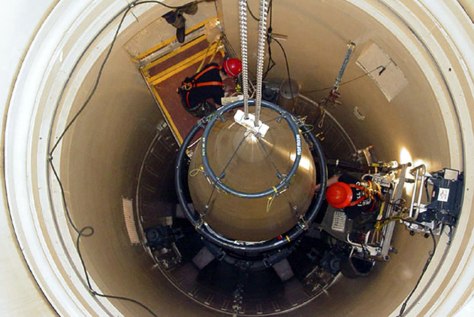
John Parie / U.S. Air
Force via AP file
A Malmstrom Air Force Base missile maintenance team
removes the upper section of an ICBM at a Montana missile
site.
By Kristen Welker, NBC News
The number
of countries that possess nuclear materials like highly
enriched uranium and plutonium that terrorists could use to create
a nuclear weapon has decreased since 2012, but serious work
remains, according to a report released
Wednesday.
The study was released by the Nuclear Threat Initiative,
a nonprofit, nonpartisan group in Washington, D.C., that promotes
the securing of nuclear materials. According to the report, over
the past two years, “seven countries — Austria, Czech Republic,
Hungary, Mexico, Sweden, Ukraine and Vietnam — have removed all or
most of their stocks of weapons-usable nuclear materials from their
territories … In doing so, they have taken one of the most
important steps toward ensuring that terrorists cannot gain access
to these nuclear materials.” The progress means the
number of nations with appreciable bomb-making nuclear material has
decreased from 32 to 25.
Read the NTI
Nuclear Materials Security
Index
The findings come
ahead of the third nuclear security summit, which will be held in
the Netherlands in March. President Barak Obama started the summit
process to improve nuclear security – a key focus of his foreign
policy.
According to the NTI
index, Australia ranks first among the remaining 25
countries in terms of overall nuclear security conditions, with
Belgium, Canada, and Japan showing the most improvement. Pakistan
ranks almost near the end at No. 22 but has improved its score by
three points by improving its regulations for protecting dangerous
materials. The United States and United Kingdom are tied for
11th place, but the U.S.
ranks first in security and control measures. Worst on the list was
North Korea.
The report also found the largest
remaining challenge is the lack of “an effective global system for
securing weapons-usable materials.”
Jon Brook
Wolfsthal, a nuclear security expert with the Monterey Institute of
International Studies and former nuclear adviser to Vice President
Joe Biden underscored the need for a global standard: “Every
country has to have a basic level of security and if any one of
them is a weak link then we’re all at risk,” Wolfsthal said. He
also noted that past presidents, including President George
W. Bush have pushed for a set of global standards but the
international community has yet to adopt
them.
Nuclear security is one of the
few issues on which Democrats and Republicans typically find common
ground. The White House called NTI’s findings “a useful tool for
measuring progress on nuclear security” and called on Congress to
pass legislation that would allow the United States to ratify two
key nuclear security treaties, raising global standards.
Congressman Ed Royce, R-Calif., chairman of the House Foreign
Affairs Committee, said he was encouraged by the progress but he
also underscored the threat that remains: “Pakistan’s inadequate
safeguards are of very great concern. Ensuring that the Pakistani
government takes all necessary steps to secure its control over
these materials must be among our highest
priorities.”
NTI was founded in 2001 by
former U.S. Sen. Nunn, D-Ga., and CNN founder Ted Turner. This is
the second index they have released on nuclear materials security.
The first report came out in 2012 ahead of that year’s nuclear
summit, held in Seoul, South
Korea.
